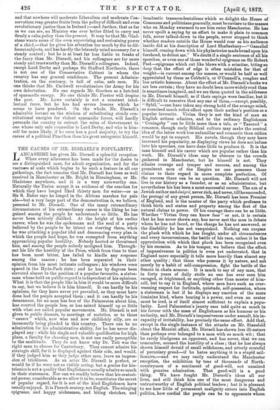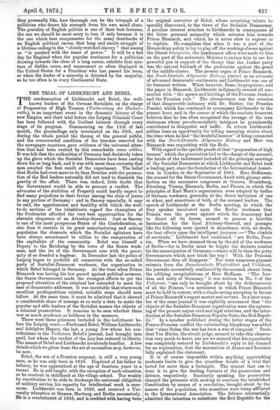THE CAUSES OF MR. DISRAELI'S POPULARITY.
LANCASHIRE has given Mr. Disraeli a splendid reception. When every allowance has been made for the desire to see a distinguished man, for adroit organization, and for the vastness of scale which begins to be such a feature in all our gatherings, the fact remains that Mr. Disraeli has been as well received in Manchester as Mr. Bright in Birmingham, or Mr. Gladstone anywhere, and it is a very noteworthy one. Naturally the Tories accept it as evidence of the reaction for which they have longed liked thirsty men for water—or as Sir S. Baker says he longed in the African marshes for pale ale—but a very large part of the demonstration is, we believe, personal to Mr. Disraeli. One of the many extraordinary circumstances of his extraordinary career is the liking he has gained among the people he understands so little. He has never been actively disliked. At the height of his earlier career, when he was the spokesman and the soul of a party believed by the people to be intent on starving them, when he was attacking a popular idol and denouncing every plan in which the people had hope, he was exempted from anything approaching popular hostility. Nobody hooted or threatened him, and among the people nobody maligned him. Through- out his life the hostility of the Press, which from time to time has been most bitter, has failed to kindle any response among the masses ; he has been separated in their opinion from his most intimate colleagues ; his windows were spared in the Hyde-Park riots ; and he has by degrees been elevated almost to the position of a popular favourite, a states- man whose hold on public regard is independent of his opinions. What it is that the people like in him it would be more difficult to say, but we believe it is him himself. It can hardly be his opinions, for they have never yet prevailed, as they must have done had the peonle accepted them ; and it can hardly be his demeanour, for no man has less of the Palmerston about him, has courted the people less, or has mixed himself up so little with what are called popular movements. Mr. Disraeli is not given to public dinners, to meetings of societies, or to those " causes " which, now wise and now childishly silly, are so incessantly being pleaded in this -country. There can be no admiration for his administrative ability, for he has never dis- played any ; while his single and valuable qualification for high place, a faculty for choosing men, is not one easily perceptible to the multitude. They do not know why Dr. Tait was the right man to choose for Canterbury. They cannot admire his strategic skill, for it is displayed against their side, and would, if they judged him as they judge other men, leave an impres- sion of trickiness. As an actor Mr. Disraeli is perfect, or would be if he were not so visibly acting, but a genius for his- trionics is not a quality that Englishmen usually admire so much in their statesmen. Nor can we readily believe that his oratori- cal power, considerable as we allow it to be, constitutes the secret of popular regard, for it is not of the kind Englishmen have usually enjoyed. It is French oratory, not English. The stinging epigrams, and happy nicknames, and biting sketches, and bombastic transcendentalisms which so delight the House of Commons and politicians generally, must be caviare to the masses who on Monday swarmed to see him enter Manchester. He has never spoilt a saying by an effort to make it plain to common folk, never talked-down to the people, never stopped to think whether readers outside the House would roar as his audience inside did at his description of Lord Shaftesbury—" Gamaliel himself, coming down with his phylacteries made broad upon his forehead, to defeat me." We doubt if a single sentence of all his speeches, or even one of those wonderful epigrams on Sir Robert Peel—epigrams which cut like blows with a scimitar, biting so deep that the effect of edge is often mistaken for that of weight—is current among the masses, or would be half as well appreciated by them as Cobbett's, or O'Connell's, rougher and less artistic humour. About the effect of Mr. Disraeli's books we are less certain; they have no doubt been more widely read than is sometimes imagined, and we see them quoted in the addresses to Mr. Disraeli himself, as if their sayings were familiar, but it is difficult to conceive that any one of them,—except, possibly, "Sybil,"—can have taken any strong hold of the average mind, or exercised much reflex effect upon their author's position as a popular favourite. Vivian Grey is not the kind of man an English artisan admires, and to the ordinary Englishman " Coningsby " can be little more than a tale, or " Tancred " a romance, though early Biblical culture may make the central idea of the latter work less unfamiliar and romantic than critics would be apt to suspect. His novels, though they may have increased his popularity, as displaying views he does not infuse into his speeches, can have done little to produce it. It is the man himself and his career which are popular rather than his work. Mr. Disraeli's ideas may be obscure to the crowds gathered in Manchester, but he himself is not. They admire courage and temper and success, and among the prominent men of the Empire no one possesses these claims to their regard in more complete perfection. Of the success there can be no question. Mr. Disraeli will not live in our history as a founder, or as an administrator, but nevertheless his has been a most successful career. The son of a Jewish author and émigré, never rich, and never, till he succeeded, the protege of any great person, Mr. Disraeli has been Premier of England, and is the master of the party which professes to think birth and status and property among the first of the natural claims to power. Of his courage there can be as little. Whether "Vivian Grey can know fear" or not, it is certain that he has never shown any, has never met the man in debate whom he has not faced, or the charge he has not answered, or the disability he has not vanquished. Nothing can surpass the pluck with which he has fought, under all circumstances and every inconvenience, the battle of his race, unless it be the appreciation with which that pluck has been recognised even by his enemies. As to his temper, we believe that the effect of impassiveness in politics is even yet underrated, that in England more especially it tells more heavily than almost any other quality ; that those who possess it by nature, and not merely by a habit of self-compression, fight the battle of the Senate in chain armour. It is much to say of any man, that in forty years of daily strife no one has ever seen him enraged, or frightened, or anything other than master of him- self, but to say it in England, where men have such an over- weening respect for fortitude, quietude, self-possession, where a statesman is lost if he displays any emotion of the more feminine kind, where bearing is a power, and even an orator must be iced, is of itself almost sufficient to explain a popu- larity. Lord Palmerston's jaunty ease told quite as much in his favour with the mass of Englishmen as his humour or his audacity, and Mr. Disraeli's impassiveness under assault, his in- capacity of irritability, has precisely the same effect. Add that, except in the single instance of the attacks on Mr. Stansfeld about the Mazzini affair, Mr. Disraeli has shown less ill-nature than perhaps ever belonged to a man with so much wit ; that he rarely bludgeons an opponent, and has never, that we can remember, aroused the hostility of a class ; that he has always shown himself devoid of small selfishness, and utterly scornful of pecuniary greed—if he hates anything it is a stupid mil- lionaire,—and we may easily understand the Manchester reception, the exhibition by tens of thousands. of North- countrymen of a sentiment of good-will, not unmixed with genuine admiration. That good-will is a good thing. We have fought Mr. Disraeli's ideas all our lives, and still think him one of the most dangerous and untrustworthy of English political leaders ; but it is pleasant to see how little of permanent malignity enters into English politics, how cordial the people can be to opponents whom
they personally like, how thorough can be the triumph of a politician who draws his strength from his own mind alone. The geniality of English politics is one of their best features, the one we should be most sorry to lose, if only because it is the one which best compensates for the many drawbacks of an English political career, that long and sterile struggle of a lifetime ending in the "closely-watched slavery" that among us "is mocked with the name of power." It will be a bad day for England when the popular sentiment for a politician drawing towards the close of a long career, exhibits that mix- ture of dislike, scorn, and amusement so often displayed in the United States for a President who has passed his term, or when the leader of a minority is detested by the majority, as he too often is in every Continental State.



































 Previous page
Previous page